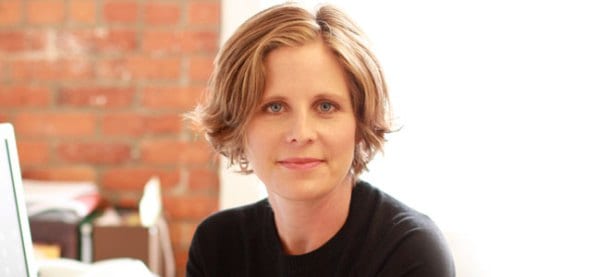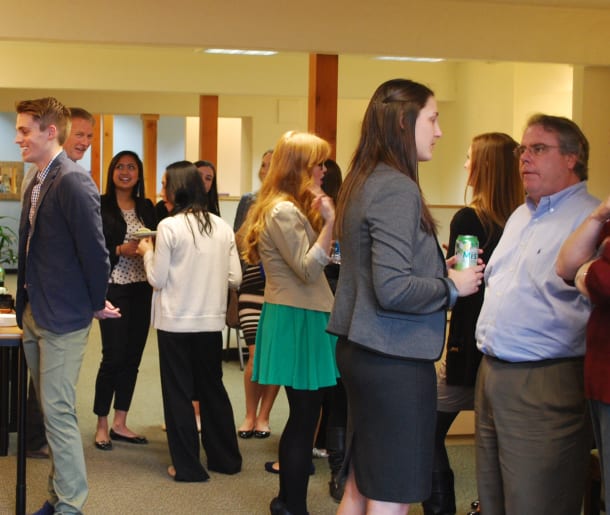Cathy Hamilton started Verb Marketing and PR, a full-service marketing communications firm, in 2003. Verb specializes in strategic planning and consulting, media relations, brand development and management and more. Hamilton runs Verb with her Creative Director, Doug Ferguson. As president, Hamilton has a variety of responsibilities ranging from strategic planning to sales to team management—ensuring that all work exceeds client expectations.
Q: How did you get where you are today?
A: That’s a huge question. I got started in public relations because I liked to write and I thought the PR field would be more diverse and varied than reporting. At that time, the advertising field required more that you could do your own design and I thought that you had to really be a true artist. Also, at this point there weren’t programs like InDesign and Photoshop and all of that, you had to be more of a natural artist, able to draw with your hand. I can art direct but not actually produce myself. So I headed into PR.
Throughout college Cathy had numerous different internships, and upon graduation Cathy received a job working in Marketing. She loved her job but was then offered a Public Affairs job in Eugene where she worked for 5 years. She wanted something more fast paced and found that she did like Marketing firms, but she felt that many of the clients were being pushed into a marketing solution for something that could more easily be solved by PR. Her mission was to change the idea of companies who worked under the notion “whatever we have…you get.” Her experience in both the Public Relations field and the Marketing field lead her to the idea integrating the two as one. Her vision was to create a small firm where the top people were always the ones working with the clients, and for her, a single person in charge of the PR and marketing.
Q: When did it “click” that this was the right field for you?
A: “I always liked writing. I think it was always clear I would do something with writing and it’s just morphed over time. It definitely started more with PR and then morphed more into marketing which I think is just more of a function of the market here and also just how communications has changed it’s just really in a totally different ball game than it was, even when I started–which was not–well I don’t think it was–that long ago. It was a totally different era for PR. It changes a lot which is what keeps me in the business. There are parts of it I don’t care for but the parts of it I do are that it is always changing so if you are a fickle person if you like that constant challenge–I mean really, right as soon as you think you’ve got it figured out it changes and you’re expected to be there ahead of the change–so if you like that kind of constant pressure it’s a great field.”
Q: What are employers most looking for in students with my background, as to day, with people just entering the field?
A: “A good writer. The ability of engage, to be responsive. What always makes me smile when we have interns is how they take feedback…I take feedback positive and negative all day long, you know? A client may not like a particular word and you just have to be able to bounce back and say ‘okay, we’ll fix that’. [In addition] you do always rely on that core desire and ability to write, that and an interest in experimenting and that willingness to be pushed all the time. “
Q: How do you see this industry changing within the next decade?
A: “I have no idea what we will see in ten years. You know, if you had asked me that ten years ago I would have said definitely electronic means. I wouldn’t have necessarily predicted the specifics of it, and I don’t think it’s even settled down yet, I think that we’re still trying to figure out. Yeah, we know social media is huge, we know how it plays in, and we know how to use it but what’s coming what’s going what the next big thing will be…is [all] up for debate. Regardless of that kind of [means] the thing that people have to be really good at is being flexible, being eager to learn. You have to have kind of an innate curiosity because that part will stay the same.”
Q: What special advice do you have for a student seeking a job within the PR and marketing fields?
A: “You’re pushed you will never become comfortable in this job. If you do then you need to be pushed a little bit more. And I think if you don’t like that it’s maybe not the right job…and there are times in life when you don’t want that, when things get chaotic you kind of want the calm which is why I’ve seen people slip in and out of the field…I think it’s more of a personality trait than a talent set. [Also you have to remember that] you will never put something forward the first time that is perfect. [This also] is a good reason to do internships, you find out what you like and don’t like and you can leave gracefully.”
Image (c) of Hamilton, Verb Marketing and PR
Post by Leigh Scheffey, PRSSA member for the 2012-2013 school year. You can contact Leigh through our blog editor: cgisler@uoregon.edu.








